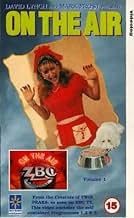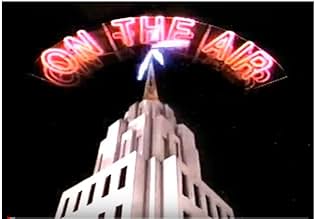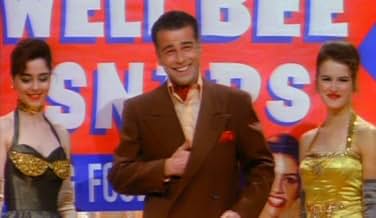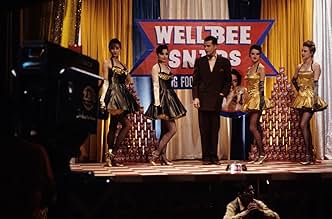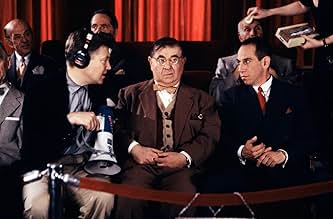IMDb-BEWERTUNG
7,2/10
1067
IHRE BEWERTUNG
In den 1950er Jahren versuchte eine Gruppe von Fernsehdarstellern, ein Live-Varieté-Programm zusammenzustellen, was oft zu katastrophalen Ergebnissen führte.In den 1950er Jahren versuchte eine Gruppe von Fernsehdarstellern, ein Live-Varieté-Programm zusammenzustellen, was oft zu katastrophalen Ergebnissen führte.In den 1950er Jahren versuchte eine Gruppe von Fernsehdarstellern, ein Live-Varieté-Programm zusammenzustellen, was oft zu katastrophalen Ergebnissen führte.
Folgen durchsuchen
Handlung
WUSSTEST DU SCHON:
- WissenswertesThis series was a mid-season replacement in 1992. Seven episodes were made, but only 2 episodes were shown as scheduled, the 3rd episode was pre-empted in most of the US.
- Zitate
Buddy Budwaller: Betty Hudson is a mistake. She's not an actress. She's not the star of the show. She's a receptionist waiting to happen.
- VerbindungenFeatured in Everything Is Terrible! Presents: The Great Satan (2018)
Ausgewählte Rezension
There is a kind of transcendent brilliance here, enhanced all the more by the project never having been finished so it's an open thread that vanishes. It's one of several ideas Lynch pitched for TV while Twin Peaks was hot, for whatever reason this one was given the go ahead.
We have only a small portion, 5 episodes plus 2 with Lynch's involvement for a total of 7. Only a handful of these aired before it was pulled. It's such a weird thing we're lucky we even got this small bit. Unsuspecting viewers would have stumbled upon it for two weeks one summer and then it vanished into air as strangely as it had appeared, and was it a prank of some kind? A glitch in programming? Was it a bit of latenight mischief that some odd soul managed to sneak into the airwaves while no one was looking?
And this is what the actual show is about. A TV show about a TV show being made that should have been harmless entertainment but mischievous forces conspire to throw a crank in the gears. The show goes awry every night - staging gear intrude upon the scene, the diva's entrance is foiled by doors, the suave protagonist of the show made a fool of, producers are flummoxed.
In the episodes without Lynch's involvement, you can see it devolve into farce and slapstick. The result is still the same as in the episodes with Lynch on board - the machinery of narrative collapse on the stage in a pile of magical chance and human buffoonery - but it's writers taking these characters and bumping them around without agency in the collapse.
It's Lynch's portion that you have to see; preferably you'll see it all, how Lynch envisions agency in the pilot, then go through the next few to see how it's harmless fun without his input. He returns again for the last one as writer only but you'll know he's there in spirit.
The protagonist of the show-within is Lester Guy, a sly charmer past his heyday. The real protagonist in Lynch's conception is his blonde simpleton costar, Betty.
Something else is taking place in his episodes. Anxieties of this innocently goofy soul - opening day anxieties in the pilot, not being able to remember the name of her mother in the last - create the dreamlike machine that collapses, spontaneously erupting with visions of that anxiety?
I watched with marvel. Somehow in all the furiously goofy stuff, Lynch manages to evoke a fragile soul who is terribly unsure about her place on that stage where life should have been without blemish, controlled, carefree.
It even adds that we have only this small bit without the James subplots that TV demands to drag its feet through whole seasons. You can imagine that she has a home somewhere that she comes back to, dreaming is she even Betty and does she perhaps have a husband who is going behind her back?
It has rocketed among my favorite works by Lynch and in general. It's the same noir god in the machine that creates Betty's world in Mulholland Drive.
We have only a small portion, 5 episodes plus 2 with Lynch's involvement for a total of 7. Only a handful of these aired before it was pulled. It's such a weird thing we're lucky we even got this small bit. Unsuspecting viewers would have stumbled upon it for two weeks one summer and then it vanished into air as strangely as it had appeared, and was it a prank of some kind? A glitch in programming? Was it a bit of latenight mischief that some odd soul managed to sneak into the airwaves while no one was looking?
And this is what the actual show is about. A TV show about a TV show being made that should have been harmless entertainment but mischievous forces conspire to throw a crank in the gears. The show goes awry every night - staging gear intrude upon the scene, the diva's entrance is foiled by doors, the suave protagonist of the show made a fool of, producers are flummoxed.
In the episodes without Lynch's involvement, you can see it devolve into farce and slapstick. The result is still the same as in the episodes with Lynch on board - the machinery of narrative collapse on the stage in a pile of magical chance and human buffoonery - but it's writers taking these characters and bumping them around without agency in the collapse.
It's Lynch's portion that you have to see; preferably you'll see it all, how Lynch envisions agency in the pilot, then go through the next few to see how it's harmless fun without his input. He returns again for the last one as writer only but you'll know he's there in spirit.
The protagonist of the show-within is Lester Guy, a sly charmer past his heyday. The real protagonist in Lynch's conception is his blonde simpleton costar, Betty.
Something else is taking place in his episodes. Anxieties of this innocently goofy soul - opening day anxieties in the pilot, not being able to remember the name of her mother in the last - create the dreamlike machine that collapses, spontaneously erupting with visions of that anxiety?
I watched with marvel. Somehow in all the furiously goofy stuff, Lynch manages to evoke a fragile soul who is terribly unsure about her place on that stage where life should have been without blemish, controlled, carefree.
It even adds that we have only this small bit without the James subplots that TV demands to drag its feet through whole seasons. You can imagine that she has a home somewhere that she comes back to, dreaming is she even Betty and does she perhaps have a husband who is going behind her back?
It has rocketed among my favorite works by Lynch and in general. It's the same noir god in the machine that creates Betty's world in Mulholland Drive.
- chaos-rampant
- 22. Apr. 2016
- Permalink
Top-Auswahl
Melde dich zum Bewerten an und greife auf die Watchlist für personalisierte Empfehlungen zu.
- How many seasons does On the Air have?Powered by Alexa
Details
Zu dieser Seite beitragen
Bearbeitung vorschlagen oder fehlenden Inhalt hinzufügen

Oberste Lücke
By what name was On the Air - Voll auf Sendung (1992) officially released in India in English?
Antwort
